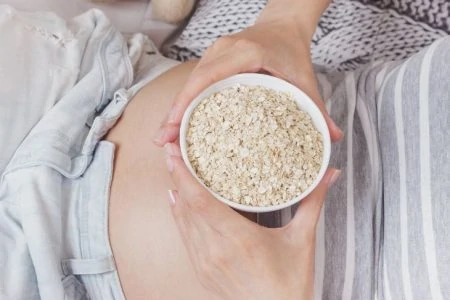Are you pregnant and dreaming of a warm bowl of oats? You aren’t alone. We couldn’t get enough of this comfort food when we were expecting.
You can dress oats up with fruit, bake them into bars, or toss them into a smoothie. It is versatile, filling, and incredibly satisfying.
Whether you have always loved breakfast grains or this is a sudden pregnancy urge, it is a great craving to have.
We will cover the safety and benefits of eating oatmeal during pregnancy. We also have a few delicious recipes to help you spice up your morning routine.
Key Takeaways
- Safe superfood: Oatmeal is safe and highly nutritious for pregnant women, offering vital minerals like iron and magnesium.
- Digestive aid: The high fiber content in oats helps combat pregnancy-related constipation and stabilizes blood sugar.
- Listen to your body: Cravings for oats may signal a need for more carbohydrates or specific nutrients.
- Choose wisely: Stick to plain steel-cut or rolled oats rather than sugary instant packets.
Is It Safe to Eat Oatmeal During Pregnancy?
Navigating food rules during pregnancy is tricky. It feels like the list of forbidden foods grows every day.
Luckily, we have good news. If you are craving oatmeal, dig in. Oats are one of the best foods you can eat while expecting.
They are safe during every trimester and offer incredible health benefits for you and your baby. This is an affordable superfood you can easily add to your weekly diet.
Food Tip
While safe, moderation is key. Eating massive amounts of fiber too quickly can cause indigestion or diarrhea. You should also watch out for instant oatmeal packets. These often contain high amounts of hidden sugar and artificial flavors.
What Nutrients Are in Oatmeal?
Oats are a nutritional powerhouse. They are packed with complex carbohydrates, which provide a slow, steady release of energy. This prevents the blood sugar crashes that often lead to fatigue.
Oats are also a fantastic source of these specific nutrients:
- Folic acid: This is crucial for fetal development. Folic acid helps prevent birth defects in the baby’s brain and spinal cord (1).
- Iron: Anemia, or low iron, is very common in pregnancy. A bowl of oats boosts your iron intake, which helps keep you from feeling exhausted.
- Calcium: Your baby takes calcium from your body to build their bones. Fortifying your diet with calcium-rich foods like oats protects your own bone density.
- Magnesium: This mineral plays a massive role in tissue repair and creates strong teeth and bones for your baby. It can also help prevent premature labor.
Are Oatmeal Cravings Normal?
Absolutely. Your body works overtime when you are pregnant. Everything you eat fuels you and the new life you are growing.
Your dietary requirements change drastically during this time. Cravings are often the body’s way of communicating a need.
Food Fact
Hormonal changes, specifically the rise in estrogen, increase your sensitivity to taste and smell. This is why certain foods suddenly taste like heaven, while others make you nauseous.
Can Oats Help With Constipation?
Constipation is a frequent complaint among pregnant women. The best way to solve it is by increasing fiber and water intake.
Oatmeal is rich in two types of fiber:
- Insoluble fiber: This adds bulk to the stool and helps food pass more quickly through the stomach and intestines (2).
- Soluble fiber: This dissolves in water and helps manage blood glucose and cholesterol levels.
This combination makes oatmeal a potent tool against irregularity. Just remember to drink plenty of water with it. Fiber without fluid can actually make constipation worse.
Remember to increase your water intake along with your fiber intake. Too much fiber without proper hydration can have a counter effect on the body and lead to constipation, gas, and bloating.
Editor's Note:
Dr. Njoud Jweihan, MD4 Delicious Oatmeal Recipes
Oats often get a bad reputation for being bland or boring. We want to end that stereotype. Plain oats are a blank canvas for delicious flavors.
You can make them savory or sweet. Here are four recipes to get you started.
1. Simple Cinnamon Oatmeal
Store-bought packets are usually sugar bombs. We want to avoid spiking our blood sugar during pregnancy.
This recipe uses natural sweeteners instead. You get a satisfying fix for your sweet tooth without the crash. Plus, cinnamon has anti-inflammatory properties that are great for the body.
2. Sweet Potato Pie Oats
Who says oatmeal is only for breakfast? This savory-but-sweet dish works great as a lunch or dinner side.
Sweet potatoes are another pregnancy superfood loaded with Vitamin A. Combining them with oats creates a meal that leaves you energized and full for hours.
3. Baked Banana Bread Oatmeal
This is perfect if you love baking but lack the energy for a complicated project. It takes less than an hour and makes your kitchen smell amazing.
It tastes like dessert, but it is packed with nutrition. It is a great way to treat yourself while still hitting your daily fiber goals.
4. Quick Maple Spice Oatmeal
You need easy, energy-building breakfasts when you are expecting. This gluten-free recipe brings together a variety of incredible ingredients for a power bowl.
It is sweetened with natural maple syrup. This gives it a warm, comforting flavor without relying on processed white sugar.
FAQs
Are You Hungry Yet?
If you are craving oats, go for it. They are a delicious way to get calcium, fiber, and folic acid into your system.
Stick to old-fashioned or steel-cut varieties to avoid excess sugar. You can boost the protein content by stirring in yogurt or milk.
One final bonus? Oats are great for your skin. Colloidal oatmeal (finely ground oats) is often used in lotions to soothe itching. If pregnancy is making your skin dry or itchy, an oatmeal bath might be just as good as an oatmeal breakfast.








